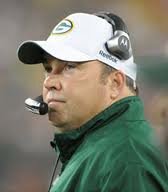 Playcalling, whether it be for offense or defense, is both a science and an art. On the one hand, coordinators have scads of film study and various tendencies on which to base their calls, along with a solid knowledge of the opposing team’s strengths and weaknesses. On the other hand…the other team knows that they have scads of film and that, too, is something to be exploited. Today I was thinking about how much of play calling on offense or defense was science and how much was art and I thought I would poll Packernation to see what you think.
Playcalling, whether it be for offense or defense, is both a science and an art. On the one hand, coordinators have scads of film study and various tendencies on which to base their calls, along with a solid knowledge of the opposing team’s strengths and weaknesses. On the other hand…the other team knows that they have scads of film and that, too, is something to be exploited. Today I was thinking about how much of play calling on offense or defense was science and how much was art and I thought I would poll Packernation to see what you think.
When Mike McCarthy or Dom Capers put a set in or a play on…they are matching wits. Matching wits with the coordinator or play-caller on the opposite sideline or booth. There is a lot of study that goes in these days in the NFL, a lot of data analyzed. But one can never count out the “bravado” factor. That human instinct to give it to your guy and let him prove that you are the better team. There is nothing to stop teams from drawing up plays that have never seen the field and therefore the film…before. The quarterback who fakes a ball “clock” and then throws to a receiver thinks it is the right time…but does he know?
So what do you think, which element factors into play calling more…the science, or the art? It makes a difference, and I know that both are involved but the question is “Which is more influential”. Make your opinion known in the poll below:

It’s players not plays…If a players is not good enough to execute the play then the play is worthless..give a good player a bad play and he can make it work!
I agree that it is players who make the play successful but I am interested in what the moment by moment motivation for the play callers (including qb checks) is? There is film study and there is a certain number of scripted plays, but in the moment there is intuition and bravado…they both factor in but which one has the most influence?
I’ve never subscribed to the players, not plays philosophy. To me, it’s all about situations and tendencies. (EG: If you try to run into a box stacked against the run, even the best RBs will struggle to find running room. When a receiver has man coverage and no safety help to his side, his odds of making a play go up drastically. When a CB is cradling his injured arm, I’m going straight at him until he proves it’s not a factor.) I think it’s the balance of players, plays, and situations that creates mismatches and success on both sides of the ball.
McCarthy went into games with a chart, he intended to call certain plays regardless of the situation. He’s not alone, many play callers use opponents’ tendencies before a game to create a game plan, and stick with it regardless of whether it’s working or not. That’s just silly to me. I might have some plays that I’d like to use in specific situations, but I’d never plan more than 1 play ahead and I’d consider the situation and opponent tendencies in that situation, before sending the play to the QB. I don’t think play callers rely upon opponents’ tendencies and situations enough.
And frankly, the hurry up offense restricts what an offense can do at any given time with the personnel on the field. I wouldn’t use it unless I had obvious mismatches on the field to exploit. But just my opinions. Go Pack go!
Having said all that, I think game plans are typically based upon both intuition and bravado, but I’d hope that intuition wins out in the end. I’d hope that my QB audibles because he sees something of which he can take advantage. And I’d hope my play caller on the sidelines is calling plays to create and take advantage of mismatches, rather than forcing something into a D that’s trying to stop the run or pass.
But in the end I want my best player deciding the outcome of a game, and in our case, that’s Rodgers more often than not. Give him 3 tries with WRs on the field to throw for a first down or audible to a run, and his odds of success go up by 3 over running the first 2 plays into a stacked box for little or no gains, and then calling a pass play on 3rd down. And completed passes keep the clock moving as well as running plays. My biggest concern with McCarthy calling plays for big games was always how he took his foot off the gas, seemed to play not to lose – which often backfires in the NFL.